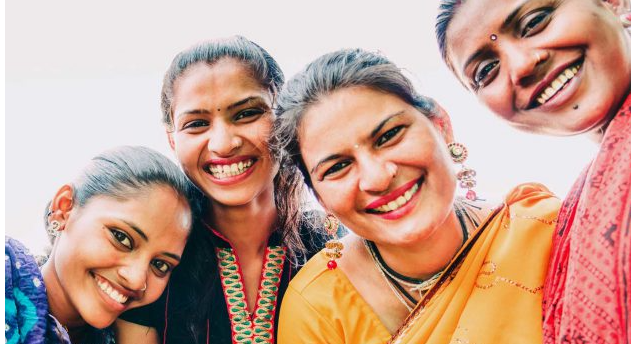The participation of Indian women in the workforce declined from 40% in 2005 to less than 25% in 2018. According to the The Power of Parity Report by McKinsey Global Institute, the contribution of women to India’s GDP now is 18 %, one of the lowest in the world.
India is the second fastest growing economy in the world and the collective goal of our government, policymakers, companies and people is to become an economic powerhouse producing 5 trillion dollar economy by 2025. The McKinsey report further states that we can add up to $770 billion—more than 18%—to our GDP by 2025, simply by giving equal opportunities to women. This is indeed a huge occasion to boost India’s GDP by increasing the participation of women in the workforce, raising the number of hours worked, and including them in higher-productivity sectors like, for example, IT services. India’s economy also has the second-largest potential in the Asia-Pacific (APAC) region from improving gender parity. More than 70% of the potential GDP opportunity comes from increasing women’s participation in the labor force by 10 percentage points.
However, this requires us to bring an incremental 68 million women into the mainstream formal sector workforce. The reasons behind women falling out of India’s labor force are both economic and cultural. Indian Society has not been able to create labor-intensive manufacturing jobs that can provide large-scale employment opportunities to women. In addition to the significant economic benefits from a higher participation of women in the workforce, female employment is usually linked to their financial well-being and socio-political empowerment, improving their overall life quality. Researches demonstrate that working women have greater power and voice while poor participation in workforce has negative consequences for their bargaining power within their households and society.
Accomplishing this, it is no doubt required a systemic change in the way the role of women is perceived by society and therefore economy. Huge investments in up-skilling and educating women since birth, financial inclusion, encouraging entrepreneur women, strengthening legal provisions for safety and security of women, are initiatives that need to be driven by policymakers and the government. More than anything else, this process should allow equal access to women for employment opportunities, providing them the support system that is required for them to stay within the workforce.
Studies 1 show that women make up 42% of new graduates, and almost 25% entry-level professionals, but of these, only 10% reach senior-level management roles and only 1% reach the CEO level.
Gi Group employs internally more than 5000 people globally. Of these, the 72,5% are women. Concerning Gi Group India workforce, the amount of women is the 50% on the total. If we take into consideration the percentage of women in managerial roles, Gi Group India reaches the 60% of females, which is a very positive data.
At Gi Group, our mission is to provide Work as a means for individuals to fulfill themselves and we are committed to providing people opportunities that allow them to experience a future that abides by principles of equality, protection of personal dignity and safety against all forms of discrimination. Helping women finding and sustaining meaningful employment opportunities is therefore only a natural extension of our corporate mission and goals.
As a part of our job, not only do we support our clients in their talent acquisition both in temporary and permanent staffing, but also we actively work with employers in India to sensitize and address their diversity and inclusion agenda having a more gender-balanced employee base.
Swapna Reddy, who was placed by Gi Group to our client Coromandel Agro, says ”Gi Group gave me the opportunity to learn and upgrade my skills and career. I got a very good team to work with and grow positively. Working until you’re completely happy with what you’ve accomplished made me understand I absolutely was in the right place.” Although Agri Industry Company is not a typical choice for women, Swapna quickly realized how rewarding this experience was, in terms of both personal growth and economic independence.
Besides all the benefits, Gi Group has also well-defined its employee-friendly policies – such as structured remote working options, ensuring quality work-life balance, tranquility and career growth at the same time. We also actively supports candidates returning from a career break. These policies are not just specific to women employees, but can also be availed by male colleagues, creating a gender-neutral work environment that fosters a supportive atmosphere for all employees and helps facing and fighting outdated socio-cultural customs.
Since almost 40% of women in corporate sector usually do not return to work after maternity leave or quit within six months after returning, Gi Group India is developing a programme for 2020, to help them positively reintegrate at work. Our Goal is to ensure they find the right balance between personal and work life.
Akanksha Kashyap, who has been working with Gi Group India for more than a decade, shares that “it is not only about good work-life balance but also a supportive environment that has helped me perform and grow within the organization“. According to Vasudha Johri, “Gi Group gave me a platform to grow in my career based entirely on my performance, value addition and integrity towards the organization while giving me a safe and supportive working environment”.
Feel free to use the contact form to ask questions, share your experience with us and exchange feedback. We are glad to share our story with you!
Marcos Segador, Country Manager Gi Staffing Services Pvt. Ltd – India.
Click here to download the full report “The Power Of Parity: Advancing Women’s Equality in Asia Pacific” by McKinsey&Company
References:
- 1 – Source – SCOPE ILO Study March 2018








